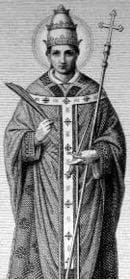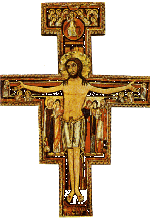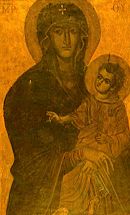Difference between revisions of "Pope Alexander I" - New World Encyclopedia
m |
m |
||
| Line 15: | Line 15: | ||
'''Pope Saint Alexander I''' was bishop of Rome for about ten years in the early second century, according the Catholic tradition. The dates of his [[episcopacy]] are estimated from as early as 106-115 and as late as 109-119 C.E. He is credited with instituting several church traditions and with being a [[martyr]], but these supposed facts are now doubted by secular and Catholic scholars alike. | '''Pope Saint Alexander I''' was bishop of Rome for about ten years in the early second century, according the Catholic tradition. The dates of his [[episcopacy]] are estimated from as early as 106-115 and as late as 109-119 C.E. He is credited with instituting several church traditions and with being a [[martyr]], but these supposed facts are now doubted by secular and Catholic scholars alike. | ||
| − | + | ==Biography== | |
| + | A Roman whose father was named after his father, Alexander was reportedly born at "Caput Tauri," thought to refer to the area of Esquiline Hill, one of the [[Seven hills of Rome]]. Nothing is known of his life before taking office. | ||
| − | ''Liber Pontificalis'' also reports that Alexander suffered [[martyr|martyrdom]] by beheading, probably under the [[Roman Emperor]] [[Trajan]] | + | According to the ''[[Liber Pontificalis]]'', it was Alexander I who inserted into the narration of the [[Last Supper]] (the ''Qui pridie'') into the Catholic [[Mass (liturgy)|mass]]. However, this claim is now considered to be anachronistic by both Catholic and non-Catholic experts. It is viewed as a product of the agenda of ''Liber Pontificalis''—this section of the book was probably written in the late fifth century—to show an ancient pattern of the earliest [[bishop]]s of Rome ruling the church by papal decree. |
| + | |||
| + | Alexander I is also said to have introduced the use of [[holy water]] and salt for the purification of Christian homes from evil influences, as well as the custom of mixing water with the sacramental wine of the [[Eucharist]]. All this, too, is considered unlikely, as is the report that he ordained six [[priests]], two [[deacons]], and five [[bishops]], since these offices are not thought to have been defined as such yet in his time. However, it is certainly possible that Alexander, whether acting singly or part of a collective leadership at Rome, played and important part in the governance of the church and the evolution of its emerging liturgical and administrative tradition. | ||
| + | |||
| + | ''Liber Pontificalis'' also reports that Alexander suffered [[martyr|martyrdom]] by beheading, probably under the [[Roman Emperor]] [[Trajan]] (or possibly [[Hadrian]]). The priest Eventius and the deacon Theodulus are said to have died with him outside of Rome. However, [[Irenaeus of Lyons]], writing much earlier, does not know this tradition. Since ''Liber Pontificalis'' reports that all the early popes were martyrs, the accuracy of this report is now treated with skepticism. The date of his death is given as May 3, and he was buried on the Via Nomentana, where his execution took place. | ||
==Legacy== | ==Legacy== | ||
Although little is known of Alexander I with certainty, he became part of a time-honored tradition that views each of the early popes as both [[saint]]s and [[martyr]]s. Three Christian martyrs named Alexander, Eventius, and Theodulus were indeed buried along the Via Nomentana, but it is now thought that Alexander was probably mistakenly identified as one of them by the writer of ''Liber Pontificalis'' or his source. His [[remains]] are said to have been transferred to [[Freising]] in [[Bavaria]], [[Germany]] in 834 C.E. | Although little is known of Alexander I with certainty, he became part of a time-honored tradition that views each of the early popes as both [[saint]]s and [[martyr]]s. Three Christian martyrs named Alexander, Eventius, and Theodulus were indeed buried along the Via Nomentana, but it is now thought that Alexander was probably mistakenly identified as one of them by the writer of ''Liber Pontificalis'' or his source. His [[remains]] are said to have been transferred to [[Freising]] in [[Bavaria]], [[Germany]] in 834 C.E. | ||
| − | A late tradition holds that in the reign of Emperor [[Hadrian]], Alexander I converted the Roman governor Hermes by miraculous means, together with his entire household 1500 souls. Saint Quirinus, who was Alexander's supposed jailer, and Quirinus' daughter Saint Balbina were also among his converts. E. Cobham Brewer [http://books.google.com/books?id=vtInZ6pOmgAC&pg=PA59&lpg=PA59&dq=pope++alexander+i+miracles&source=bl&ots=5njnJEzvEW&sig=s-uEiurlbukd4k4UKkoTFMrun1M#PPA59,M1 A Dictionary of Miracles] London: Chatto and Windus, 1901. Retrieved November 26, 2008. | + | A late tradition holds that in the reign of Emperor [[Hadrian]], Alexander I converted the Roman governor Hermes by miraculous means, together with his entire household 1500 souls. Saint Quirinus, who was Alexander's supposed jailer, and Quirinus' daughter Saint Balbina were also among his converts. E. Cobham Brewer <ref>[http://books.google.com/books?id=vtInZ6pOmgAC&pg=PA59&lpg=PA59&dq=pope++alexander+i+miracles&source=bl&ots=5njnJEzvEW&sig=s-uEiurlbukd4k4UKkoTFMrun1M#PPA59,M1 A Dictionary of Miracles] London: Chatto and Windus, 1901. Retrieved November 26, 2008.</ref> |
Alexander's feast day is celebrated on May 3, the traditional date of his death. The identification of Alexander as a martyr was removed from the Roman Calendar by [[Pope John XXIII]] in 1960 as lacking historical basis. | Alexander's feast day is celebrated on May 3, the traditional date of his death. The identification of Alexander as a martyr was removed from the Roman Calendar by [[Pope John XXIII]] in 1960 as lacking historical basis. | ||
Revision as of 15:33, 26 November 2008
| Saint Alexander I | |
|---|---|

| |
| Birth name | Alexander |
| Papacy began | ca. 106 |
| Papacy ended | ca. 115 |
| Predecessor | Evaristus |
| Successor | Sixtus I |
| Born | unknown date Rome, Italy |
| Died | ca. 115 Rome, Italy |
| Other popes named Alexander | |
Pope Saint Alexander I was bishop of Rome for about ten years in the early second century, according the Catholic tradition. The dates of his episcopacy are estimated from as early as 106-115 and as late as 109-119 C.E. He is credited with instituting several church traditions and with being a martyr, but these supposed facts are now doubted by secular and Catholic scholars alike.
Biography
A Roman whose father was named after his father, Alexander was reportedly born at "Caput Tauri," thought to refer to the area of Esquiline Hill, one of the Seven hills of Rome. Nothing is known of his life before taking office.
According to the Liber Pontificalis, it was Alexander I who inserted into the narration of the Last Supper (the Qui pridie) into the Catholic mass. However, this claim is now considered to be anachronistic by both Catholic and non-Catholic experts. It is viewed as a product of the agenda of Liber Pontificalis—this section of the book was probably written in the late fifth century—to show an ancient pattern of the earliest bishops of Rome ruling the church by papal decree.
Alexander I is also said to have introduced the use of holy water and salt for the purification of Christian homes from evil influences, as well as the custom of mixing water with the sacramental wine of the Eucharist. All this, too, is considered unlikely, as is the report that he ordained six priests, two deacons, and five bishops, since these offices are not thought to have been defined as such yet in his time. However, it is certainly possible that Alexander, whether acting singly or part of a collective leadership at Rome, played and important part in the governance of the church and the evolution of its emerging liturgical and administrative tradition.
Liber Pontificalis also reports that Alexander suffered martyrdom by beheading, probably under the Roman Emperor Trajan (or possibly Hadrian). The priest Eventius and the deacon Theodulus are said to have died with him outside of Rome. However, Irenaeus of Lyons, writing much earlier, does not know this tradition. Since Liber Pontificalis reports that all the early popes were martyrs, the accuracy of this report is now treated with skepticism. The date of his death is given as May 3, and he was buried on the Via Nomentana, where his execution took place.
Legacy
Although little is known of Alexander I with certainty, he became part of a time-honored tradition that views each of the early popes as both saints and martyrs. Three Christian martyrs named Alexander, Eventius, and Theodulus were indeed buried along the Via Nomentana, but it is now thought that Alexander was probably mistakenly identified as one of them by the writer of Liber Pontificalis or his source. His remains are said to have been transferred to Freising in Bavaria, Germany in 834 C.E.
A late tradition holds that in the reign of Emperor Hadrian, Alexander I converted the Roman governor Hermes by miraculous means, together with his entire household 1500 souls. Saint Quirinus, who was Alexander's supposed jailer, and Quirinus' daughter Saint Balbina were also among his converts. E. Cobham Brewer [1]
Alexander's feast day is celebrated on May 3, the traditional date of his death. The identification of Alexander as a martyr was removed from the Roman Calendar by Pope John XXIII in 1960 as lacking historical basis.
| Roman Catholic Popes | ||
|---|---|---|
| Preceded by: Evaristus |
Bishop of Rome Pope 106–115 |
Succeeded by: Sixtus I |
ReferencesISBN links support NWE through referral fees
Alexander I in the reign of Hadrian converted Hermes the governor and all his house to the number of 1500 souls
External links
| ||||||||||||||||
| |||||||||||||||||||||||||||||||||||||||||||||
| |||||||||||||||||||||||||||||||||||||||||
Credits
New World Encyclopedia writers and editors rewrote and completed the Wikipedia article in accordance with New World Encyclopedia standards. This article abides by terms of the Creative Commons CC-by-sa 3.0 License (CC-by-sa), which may be used and disseminated with proper attribution. Credit is due under the terms of this license that can reference both the New World Encyclopedia contributors and the selfless volunteer contributors of the Wikimedia Foundation. To cite this article click here for a list of acceptable citing formats.The history of earlier contributions by wikipedians is accessible to researchers here:
The history of this article since it was imported to New World Encyclopedia:
Note: Some restrictions may apply to use of individual images which are separately licensed.
- ↑ A Dictionary of Miracles London: Chatto and Windus, 1901. Retrieved November 26, 2008.

